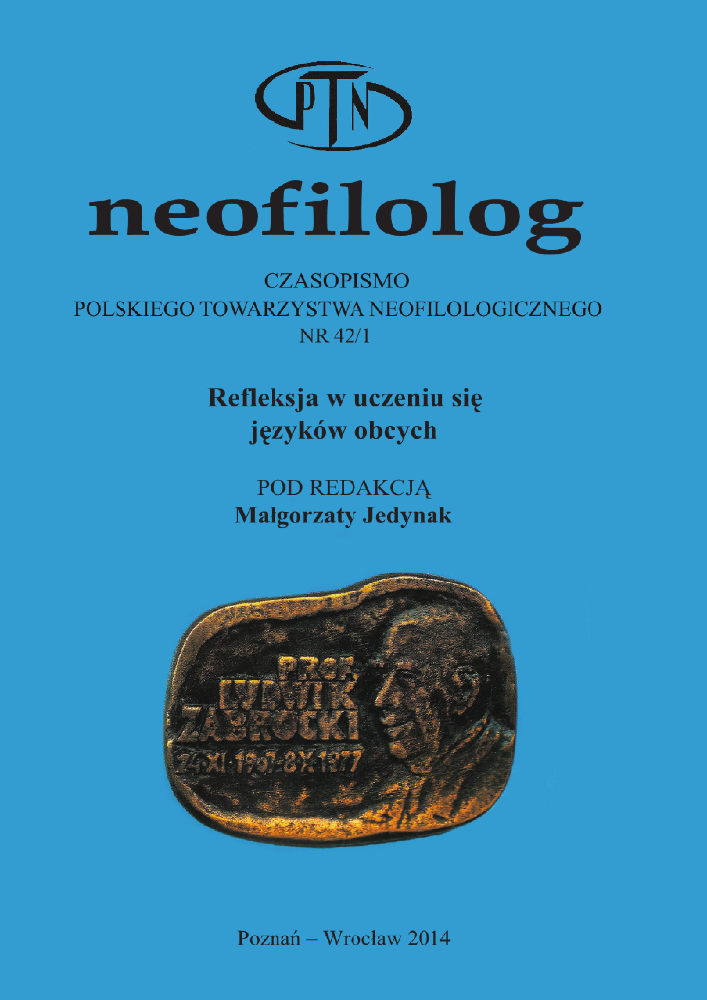Abstrakt
This article reports the findings of a qualitative study aimed at investigating how the use of technology-based resources in out-of-class self-study by learners of English affects their level of reflectivity during the process of learning pronunciation. Using as a research tool learners’ diaries submitted on Moodle, the study also explores the value of such diaries in promoting reflection in learners. The findings largely confirmed the considerable role played by technology-based self-study and diary writing in enhancing reflection on learning pronunciation in the participants. These reflections concerned their growing phonological awareness, the use of materials appropriate for pronunciation practice, pronunciation learning strategies, and the affective side of learning. The didactic implications include the need to employ a wide range of technology-based resources for self-study and to encourage learners to keep reflective diaries as part of their pronunciation instruction.Bibliografia
American English Pronunciation Podcast (by Seattle Learning Academy) (dostęp: https://itunes.apple.com/us/podcast/american-english-pronunciation/id276921054, odczyt: 7.06.2013).
Busa, M. G. 2008. „New perspectives in teaching pronunciation” (dostęp: http://etabeta.univ.trieste.it/dspace/bitstream/10077/2850/1/bus%C3%A0.pdf, odczyt: 3.07.2013).
Chun, D. 2006. „Technological advances in researching and teaching phonology”. (w:) Pennington, M. C. (red.). Phonology in context. Luton: Palgrave Macmillan. 274-299.
Chun, D. 2012. „Computer-assisted pronunciation teaching”. (w:) Chapelle, C. (red.). The Encyclopedia of applied linguistics. Oxford: Wiley-Blackwell. 823-834.
Dantas-Whitney, M. 2002. „Critical reflection in the second language classroom through audiotaped journals”. (w:) System 30: 543-555.
Derwing, T. 2008. „Curriculum issues in teaching pronunciation to second language learners”. (w:) Hansen Edwards, J. I. i Zampini, M. (red.) Phonology and second language acquisition. Amsterdam/Philadelphia: John Benjamins Publishing Company. 347-369.
Dörnyei, Z. 2007. Research methods in applied linguistics: quantitative, qualitative, and mixed methodologies. Oxford: Oxford University Press.
Ducate, L. i Lomicka, L. 2009. „Podcasting: An effective tool for honing language students’ pronunciation?”. (w:) Language Learning & Technology 13: 66-86.
Ghaye, T. 2011. Teaching and learning through reflective practice. A practical guide for positive action (2nd edition). London and New York: Routledge.
Hinett, K. 2002. Improving learning through reflection – part one. The Higher Educa-tion Academy. (dostęp: http://heacademy.ac.uk/assets/documents/resources/database/id485_improving_learning_part_one.pdf. odczyt: 3.07.2013).
Jones, R. 2002. „Beyond “Listen and Repeat”: Pronunciation teaching materials and theories of second language acquisition”. (w:) Richards, J. i Renandya, W. (red.). Methodology in language teaching. An anthology of current practice. Cambridge: Cambridge University Press. 178-187.
Kohonen V. 2007. „Learning to learn through reflection – an experiential learning perspective”. (w:) Preparing teachers to use the European language portfolio – arguments, materials and resources. New York: Council of Europe Publishing (dostęp: http://archive.ecml.at/mtp2/Elp_tt/Results/DM_layout/00_10/05/Supplementary%20text%20E.pdf, odczyt: 20.08.2013).
Levis, J. 2007. „Computer technology in teaching and researching pronunciation”. (w:) Annual Review of Applied Linguistics 27: 184-202.
Lord, G. 2008. „Podcasting communities and second language pronunciation”. (w:) Foreign Language Annals 41: 364-379.
Moon, J. 1999. Reflection in Learning and Professional Development, Theory and Practice. London: Kogan Page.
Moon, J. 2004. A handbook of reflective and experiential learning: theory and practice. New York: Routledge Falmer.
Pavlenko, A. 2007. „Autobiographic narratives as data in applied linguistics”. (w:) Applied Linguistics 28: 163-188.
Pawlak, M. 2011. „Students’ successes and failures in learning foreign language pronunciation: Insights from diary data”. (w:) Arabski, J. i Wojtaszek, A. (red.). The Acquisition of L2 Phonology. Bristol: Multilingual Matters. 165-182.
Pennington, M. 1995. „Recent research in second language phonology: Implications for practice”. (w:) Morley, J. (red.). Pronunciation, pedagogy and theory: New views, new directions. Alexandria, VA: TESOL. 94-108.
Race, P. 2002. „Evidencing reflection: putting the ‘w’ into reflection”. (dostęp: http://escalate.ac.uk/resources/reflection/, odczyt: 12.08.2013).
Sawala, K., Szczegóła, T., Jankowski, M. i Weckwerth, J. 2012. Say it right - multimedialny kurs wymowy i słownictwa angielskiego wersja 3.0. poprawiona (+ DVD-ROM). Poznań: SuperMemo World - Oficyna Wydawnicza Atena.
Seidlhofer, B. 2001. „Pronunciation”. (w:) Carter, R. i Nunan, D. (red.). The Cambridge guide to teaching English to speakers of other languages. Cambridge: Cambridge University Press. 55-65.
Setter, J. i Jenkins, J. 2005. „Pronunciation”. (w:) Language Teaching 38: 1-17.
Sobkowiak W. 2012. Five years in second life, or: phonetically augmented virtuality in second life english as a foreign language. On-line: Scribd. (dostęp: http://www.scribd.com/doc/108718699/Paving-EFL-in-SL, odczyt: 6.02.2013).
Strampel, K. i Oliver, R. 2007. „Using technology to foster reflection in higher education”. (w:) ICT: Providing choices for learners and learning. Proceedings Ascilite Singapore 2007. (dostęp: http://www.ascilite.org.au/conferences/singapore07/procs/strampel.pdf, odczyt: 6.06.2013).
Vitanova, G. i Miller, A. 2002. „Reflective practice in pronunciation learning”. (w:) The Internet TESL Journal 8. (dostęp: http://iteslj.org/Articles/Vitanova-Pronunciation.html, odczyt: 6.06.2013).
Wrembel, M. 2008. „In search of effective strategies for L2 pronunciation teaching and learning”. (w:) Pawlak, M. (red.). Investigating english language learning and teaching. Poznań-Kalisz: Adam Mickiewicz University Press. 179-194.
Zhang, F. 2012. „Combining the body and mobile technology to teach English pronunciation”. (w:) Zhang, F. (red.). Computer-enhanced and mobile-assisted language learning: emerging issues and trends. Hershey PA: IGI Global: 202-219.
Licencja
Prawa autorskie (c) 2019 Aleksandra Wach

Utwór dostępny jest na licencji Creative Commons Uznanie autorstwa – Bez utworów zależnych 4.0 Międzynarodowe.
Przedstawiany utwór (artykuł) upubliczniany jest na podstawie umowy z autorem i na licencji Creative Commons Attribution-NoDerivatives 4.0 International (CC BY-ND 4.0).
Użytkownicy mają obowiązek podania wraz z rozpowszechnionym utworem, informacji o autorstwie, tytule, źródle (odnośniki do oryginalnego utworu, DOI) oraz samej licencji;
- bez tworzenia utworów zależnych,
- utwór musi być zachowany w oryginalnej postaci.
Uniwersytet im. Adama Mickiewicza w Poznaniu zachowuje prawo do czasopisma jako całości (układ, forma graficzna, tytuł, projekt okładki, logo itp.).
